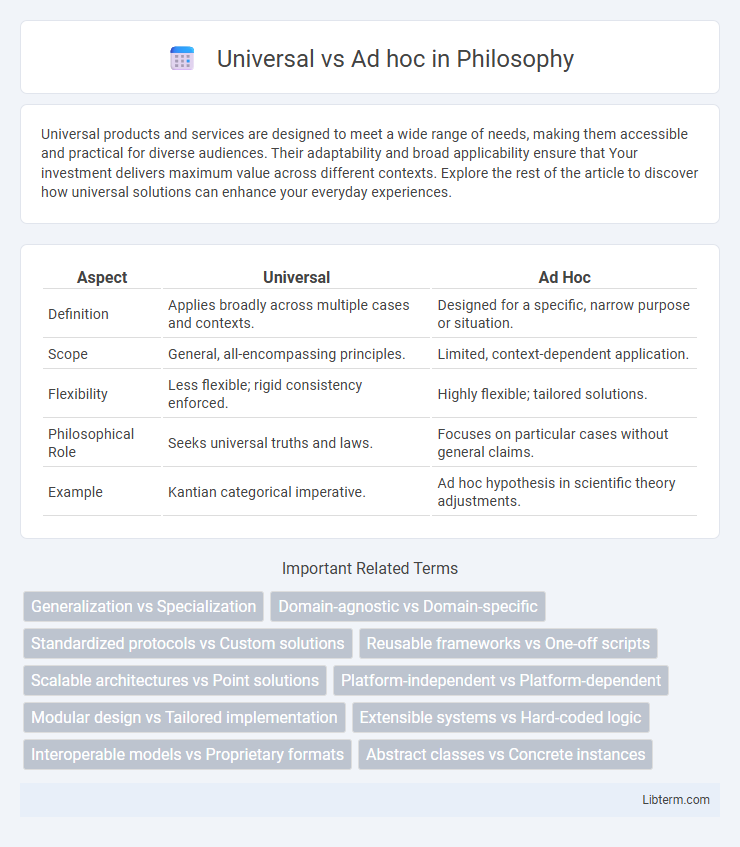Universal products and services are designed to meet a wide range of needs, making them accessible and practical for diverse audiences. Their adaptability and broad applicability ensure that Your investment delivers maximum value across different contexts. Explore the rest of the article to discover how universal solutions can enhance your everyday experiences.
Table of Comparison
| Aspect | Universal | Ad Hoc |
|---|---|---|
| Definition | Applies broadly across multiple cases and contexts. | Designed for a specific, narrow purpose or situation. |
| Scope | General, all-encompassing principles. | Limited, context-dependent application. |
| Flexibility | Less flexible; rigid consistency enforced. | Highly flexible; tailored solutions. |
| Philosophical Role | Seeks universal truths and laws. | Focuses on particular cases without general claims. |
| Example | Kantian categorical imperative. | Ad hoc hypothesis in scientific theory adjustments. |
Understanding Universal and Ad Hoc: Key Definitions
Universal refers to a system or solution designed to work broadly across multiple contexts or platforms, ensuring compatibility and consistency. Ad hoc describes a specialized, often temporary arrangement created for a specific purpose or situation without prior planning. Understanding these definitions highlights universal approaches as scalable and reusable, while ad hoc solutions emphasize tailored, context-sensitive responses.
Historical Context of Universal and Ad Hoc Approaches
Universal approaches trace their origins to early 20th-century efforts aimed at creating standardized, broad-spectrum solutions applicable across diverse contexts, reflecting an era of industrialization and modernization. Ad hoc methods emerged prominently during World War II as pragmatic, situation-specific responses designed to address unique, immediate challenges without relying on pre-existing universal frameworks. The historical evolution reveals a shift from rigid, all-encompassing models toward flexible, context-driven strategies tailored to dynamic environments and specific needs.
Core Differences Between Universal and Ad Hoc Solutions
Universal solutions provide standardized, scalable frameworks designed to address a wide range of problems across multiple contexts, ensuring consistency and broad applicability. Ad hoc solutions are tailored, context-specific fixes developed to solve immediate, unique issues without the intention of general reuse or scalability. Core differences lie in their scope, with universal approaches emphasizing long-term efficiency and reusability, while ad hoc methods prioritize rapid, customized responses to singular challenges.
Advantages of Universal Strategies
Universal strategies offer scalable and consistent solutions across diverse markets, enhancing brand recognition and operational efficiency. They allow companies to leverage economies of scale by standardizing products and marketing efforts, leading to cost reductions and faster global expansion. Implementing a universal approach ensures a unified brand message, strengthening customer loyalty and competitive positioning worldwide.
Benefits and Limitations of Ad Hoc Methods
Ad hoc methods provide flexibility and rapid implementation, allowing tailored solutions to unique or evolving problems without rigid protocols. These methods enable quick decision-making and customization, which is ideal in dynamic environments or when standardized processes are insufficient. However, ad hoc approaches often lack consistency and scalability, leading to potential inefficiencies, increased risk of errors, and difficulties in maintaining quality control over time.
Real-World Applications: Universal vs Ad Hoc
Universal systems offer standardized solutions applicable across diverse industries, enhancing scalability and interoperability in real-world applications such as global communication networks and enterprise software platforms. Ad hoc systems provide tailored, flexible responses to specific, localized problems, often seen in emergency response teams and event-specific wireless networks where rapid deployment and customization are crucial. The choice between universal and ad hoc depends on the balance between the need for broad applicability and the demand for specialized, context-sensitive solutions.
When to Choose Universal Over Ad Hoc
Choose a universal approach when consistency, scalability, and broad applicability across diverse environments are essential, ensuring standardized processes and easier maintenance. Universal solutions work best in large organizations or systems requiring uniformity across multiple locations or platforms. In contrast, ad hoc methods suit unique, one-time, or highly specialized tasks that demand flexibility and quick customization.
Common Challenges in Implementing Both Approaches
Universal and ad hoc approaches often face challenges such as scalability issues and resource allocation inefficiencies. Both methods struggle with maintaining consistent performance while adapting to diverse and evolving requirements in real-time environments. Integration difficulties and the need for continuous updates create significant hurdles in deploying and sustaining these strategies effectively.
Universal vs Ad Hoc: Case Studies and Examples
Universal systems offer standardized, scalable solutions applicable across multiple industries, as seen in platforms like Salesforce, which streamline customer relationship management globally. Ad hoc approaches are tailored, project-specific solutions addressing unique challenges, exemplified by custom software developed for a healthcare provider's specialized patient tracking needs. Case studies reveal that universal solutions optimize efficiency and integration, while ad hoc systems excel in flexibility and niche problem-solving.
Future Trends in Universal and Ad Hoc Approaches
Future trends in universal approaches emphasize scalability and interoperability across diverse platforms, leveraging AI and machine learning to create adaptive systems that anticipate user needs. Ad hoc methods are evolving towards dynamic, context-aware networks that prioritize rapid deployment and localized problem solving, benefiting from advancements in edge computing and 5G technology. Integration of AI-driven decision-making in both universal and ad hoc frameworks will enhance flexibility and efficiency in complex, real-time environments.
Universal Infographic

 libterm.com
libterm.com